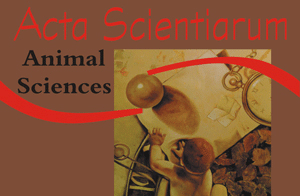ABSTRACT.
Waste oil from olive oil extraction industry was used, instead of soybean oil, in heavy roosters’ diet in order to evaluate birds’ reproductive parameters. A total of forty roosters were housed individually in boxes with 1.2 m². Two experimental diets were used: control diet, based on corn, soybean meal, and soybean oil; and test diet, where soybean oil was totally replaced by waste oil. In order to verify weight gain and feed intake, animals were individually weighed weekly. Seven semen collections were performed with fifteen-day interval. Reproductive variables analyzed sperm volume, motility, concentration, and morphology. No statistical difference (p > 0.05) was observed between treatments at the different collection periods for the variables sperm volume, motility, and concentration. There was a statistically significant difference between treatments for body weight in periods three (p = 0.04), and seven (p = 0.04). Statistical differences (p = 0.01) were also observed between treatments for abnormal sperm morphology. Among collection periods, statistical difference was observed for motility (p = 0.00), and sperm concentration (p = 0.01). Total replacement of soybean oil by waste oil from olive oil extraction in young heavy roosters’ diets does not affect sperm volume, motility, and concentration; reduces defects in sperm tail, and promotes better weight gain control.
Keywords:
broiler breeders; industrial waste; males; olive trees; semen

 Thumbnail
Thumbnail
